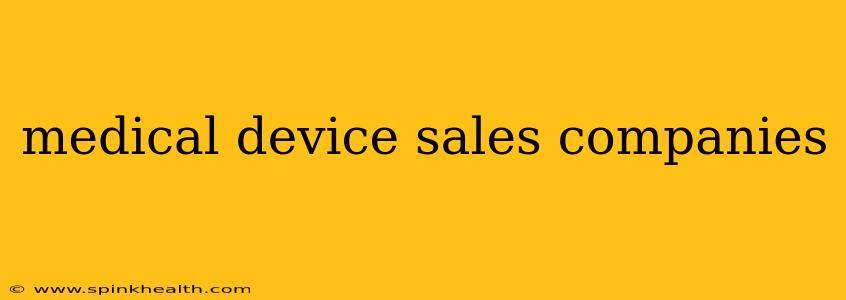The medical device industry is a dynamic and ever-evolving landscape, filled with innovation, regulation, and a constant drive to improve patient care. At the heart of this industry are the medical device sales companies, the crucial link between cutting-edge technology and the healthcare professionals who utilize it. But understanding this complex ecosystem can be challenging. This exploration will unravel the intricacies of these companies, addressing common questions and offering valuable insights.
What are the different types of medical device sales companies?
The world of medical device sales isn't monolithic. Think of it like a branching tree, with various specialties sprouting from the trunk. Some companies focus on a specific niche, like orthopedic implants or cardiovascular devices, while others offer a broader portfolio. We can categorize them broadly:
-
Large Multinational Corporations: These giants, like Medtronic, Johnson & Johnson, and Abbott, often have extensive product lines, global reach, and significant resources dedicated to research and development. Their sales teams are typically highly structured, with specialized roles for each product category.
-
Smaller, Specialized Companies: These companies often focus on a particular area of medical technology, such as minimally invasive surgery tools or advanced diagnostic imaging equipment. Their sales teams are usually smaller and more agile, allowing for a closer relationship with healthcare providers.
-
Distributor Companies: These companies act as intermediaries, purchasing devices from manufacturers and then selling them to hospitals and clinics. They often manage logistics and inventory, providing a convenient single point of contact for healthcare facilities.
What are some examples of successful medical device sales companies?
The success of a medical device sales company is often measured by its innovative product portfolio, market share, and revenue. Here are a few prominent examples:
-
Medtronic: A global leader in medical technology, Medtronic offers a vast range of devices, from cardiac pacemakers to spinal implants. Their success stems from consistent innovation and a strong global presence.
-
Johnson & Johnson: A diversified healthcare conglomerate, J&J's medical device division is a significant contributor to their overall success. Their extensive portfolio and established brand recognition contribute to their market dominance.
-
Abbott Laboratories: Abbott is known for its innovative products in diagnostics, medical devices, and pharmaceuticals. Their commitment to research and development continually drives their growth.
How do medical device sales companies work?
The sales process for medical devices is intricate, often involving multiple stakeholders and lengthy sales cycles. It's not a simple transaction; it requires building trust and demonstrating the value proposition of the technology to healthcare professionals.
-
Building Relationships: Sales representatives often cultivate long-term relationships with surgeons, hospital administrators, and other key decision-makers.
-
Clinical Evidence and Data: Demonstrating the efficacy and safety of medical devices through rigorous clinical trials and data is paramount.
-
Regulatory Compliance: Navigating the complex regulatory landscape, including FDA approvals and international certifications, is a critical aspect of the sales process.
-
Training and Support: Many sales companies provide comprehensive training and ongoing support to healthcare professionals to ensure the proper use of their devices.
What skills are needed to work in medical device sales?
A career in medical device sales is demanding but rewarding. Success requires a unique blend of skills:
-
Scientific Knowledge: A solid understanding of medical technology, anatomy, and physiology is essential.
-
Sales and Marketing Acumen: Effective communication, negotiation, and presentation skills are crucial for persuading healthcare professionals to adopt new technologies.
-
Relationship Building: Cultivating trust and rapport with healthcare providers is key to long-term success.
-
Regulatory Knowledge: Familiarity with FDA regulations and other relevant guidelines is necessary.
What are the challenges faced by medical device sales companies?
The medical device industry faces ongoing challenges:
-
Regulatory Hurdles: The stringent regulatory landscape requires significant investment in compliance and can slow down product launches.
-
Pricing Pressure: Hospitals and insurance companies are under increasing pressure to control costs, leading to negotiations over device pricing.
-
Competition: The industry is highly competitive, with companies continually innovating and vying for market share.
-
Reimbursement Challenges: Securing reimbursement from insurance providers for new devices can be a significant challenge.
The medical device sales industry is a complex and fascinating world. From the multinational corporations to the smaller, specialized firms, each player plays a vital role in advancing healthcare technology and improving patient outcomes. This exploration provides a glimpse into this dynamic landscape, offering insights into its nuances and the challenges and rewards of participating in this vital field.

